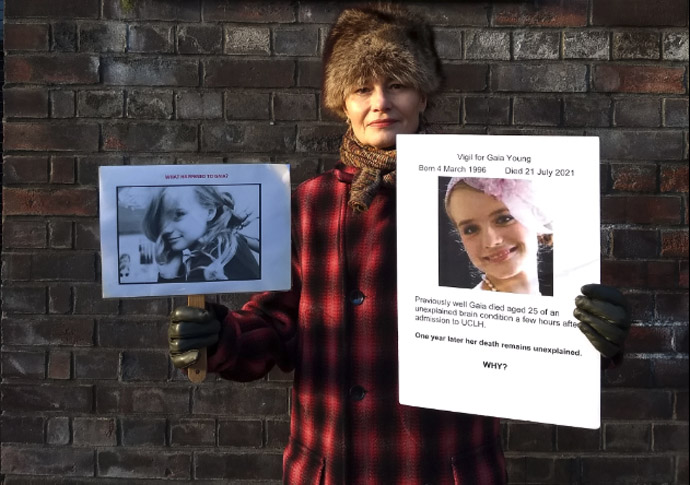Lessons from my search for the truth
Dorit Young is seeking answers after the death of her daughter in 2021
Friday, 2nd June 2023 — By Dorit Young

Dorit Young’s quest for answers leads her to the coroner’s court
MY daughter Gaia died in UCLH 17 hours after emergency admission on a Saturday night in July 2021.
Although her death sent shockwaves through the hospital, it is still unexplained. I am continuing to fight for the truth for Gaia.
If I had known what I learnt during this battle, my daughter might still be alive.
• Lesson 1: Stay with your loved one.
I wasn’t allowed to accompany Gaia in the ambulance and the hospital turned me away due to Covid. Be a nuisance, insist on staying, as you know the patient best.
• Lesson 2: Make sure your background information is heard by those who need it.
The ambulance crew knew that Gaia was not intoxicated. Yet this critical information was lost at the handover to UCLH. You can supply those crucial background facts.
• Lesson 3: Be extra vigilant on weekends.
My experience is that least-experienced clinicians staff the wards at the weekend whilst being trained. During Gaia’s stay three junior doctors (two in their first year) at the hospital were responsible for 57 beds and about 15 admissions per night. Other high-risk industries (like aviation or nuclear) have no “skills dip”.
• Lesson 4: Don’t assume that the doctors always know best.
Because of her age and unfortunate weekend timing, Gaia’s acute symptoms of headache, vomiting and confusion were assumed to be due to intoxication despite her denials. She was put on a drip and left to “sober up” for 10 wasted hours. Trust your instincts and challenge clinicians.
• Lesson 5: Fundoscopy versus CT Scan.
Medicine has become over-reliant on imaging technologies; manual diagnostics have become old-fashioned. Be aware that there are situations when hi-tech diagnostics can’t tell the truth. A simple quick look into Gaia’s eyes with a fundoscope would have shown that increased brain pressure, a life-threatening condition, caused her symptoms. Instead her CT scan 13 hours later was wrongly reported as “normal”.
• Lesson 6: Don’t wait for the hospital to contact you.
UCLH made two half-hearted attempts to call me from a withheld number with no message being left. I was not asked for valuable background information which would have helped, nor kept informed or made aware of how ill Gaia really was.
• Lesson 7: A sudden death and clinicians will close ranks.
Why was I not gently taken through what had happened and told that Gaia was actually brain-dead? I learned that medics would hold back if there is a possibility of substandard care.
• Lesson 8: The brutal reality of organ donation.
Gaia was put onto a ventilator to preserve her organs for donation. Gaia had signed up as donor. Nevertheless, I could have refused permission. The donor’s family will have the final word. Ask any question, take your time, even if you are being told that time is of the essence.
• Lesson 9: No Trust shall investigate itself.
The UCLH Trust promised to carefully review every aspect of Gaia’s death; instead, complacency and obfuscation have been prevailing. Its two pointless Serious Incident Reports concluded that Gaia’s was a “tragic and unusual” death. My view is that trusts tend to value their reputation over patient safety and learning.
• Lesson 10: Be ready for the coroner’s inquest.
Gaia’s coroner allowed UCLH to choose their medical expert, but discarded my request for an independent neurologist. Despite Gaia having died of a brain condition, no neurologist was present at her inconclusive inquest. The lesson I learnt is that coroners have a “working relationship” with hospitals, are rarely medically trained and depend on the clinicians’ information.
• Lesson 11: Fight back
You will need the support of medically and legally qualified friends. Any publicity and public scrutiny trumps investigation. Simple vigils outside the Trust headquarters and at public board meetings make a difference.
I am a great believer in the NHS but when it fails us we must hold it to account.
Nothing will bring Gaia back, but if my perseverance will help to bring about better outcomes for others it would be a fitting legacy for my beloved daughter.
What UCLH have said
IN relation to this case, a UCLH spokesperson has said previously: “We understand this continues to be an extremely sad time for Gaia’s mother and loved ones, and offer our deepest sympathies.
“While the coroner could not say that different care could have prevented Gaia’s death, we do acknowledge some things could have been done better.”
They added: “We are therefore commissioning an external review, by an independent neurologist, to explore further the circumstances surrounding Gaia’s death. This will build on the learning from our internal investigation and the coroner’s report.
“We have invited Gaia’s mother to meet with us so we can discuss her daughter’s care and next steps.”